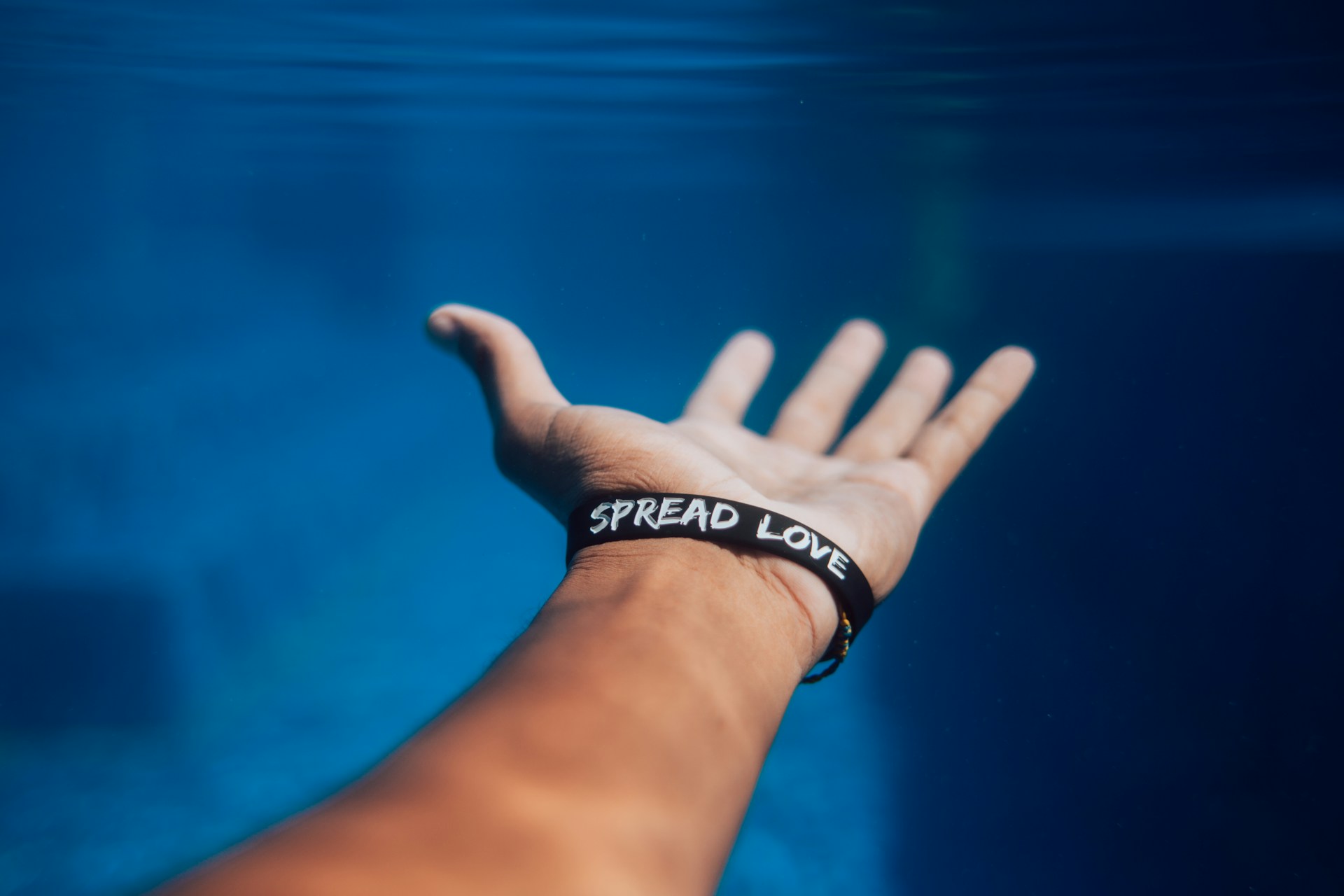A few millennia ago, a wise person wrote “Above all else, guard your heart, for it is the wellspring of life” (Proverbs 4:23, NIV). Inside the culture from which this proverb emerged, your heart was the seat of your desires, your will, your emotions, and the source of your actions. In other words, your heart is what makes you who you are, and you need to guard what goes into and influences it because it can determine the course of your life.
 We are constantly bombarded with messages about who we are and what makes us valuable. Through social media, interactions with friends, movies, and music, and through magazines and legacy media, our tastes, worldviews, interests, and passions are shaped.
We are constantly bombarded with messages about who we are and what makes us valuable. Through social media, interactions with friends, movies, and music, and through magazines and legacy media, our tastes, worldviews, interests, and passions are shaped.
This is to say nothing of how our family, friends, and the culture we are embedded in work the same way to shape who we are. These various influences and our life experiences can combine to help us form a healthy view of ourselves, but they can also conspire to create an unhealthy or negative view of our bodies and ourselves.
Understanding body image
Body image relates to the feelings, thoughts, attitudes, and experiences of your own body. We can appreciate our bodies, but we can also have a negative attitude toward them. Any number of influences from your life experience and the culture in which you’re embedded can shape your body image. In the U.S., most of our media portray the standard of beauty in a certain way.
If you accept that standard, it can lead to dissatisfaction with who you are, or pressure to maintain a certain feature. A negative body image emerges when you dislike your body (or parts of it) and you have a negative attitude toward yourself and your body’s capabilities.
A person’s body image can relate to certain parts of their body and whether they are happy with them. One can have a negative body image concerning their skin, body size, shape, and certain features because they don’t conform to a particular ideal.
A negative body image may develop for this reason, but it can also develop as a result of being bullied or made fun of for possessing a certain feature or set of features. Having an accident that alters your body, such as losing a limb, or having a chronic condition such as eczema can also influence and lead to a negative body image. Such negative life experiences have a profound impact on how people perceive themselves.
It’s important to note that just because a person looks a certain way or because they’ve had certain experiences doesn’t mean they automatically develop a negative body image. One person may have freckles and appreciate them as a feature that makes them who they are, while another will do everything in their power to get rid of them. The individual has a huge role to play in whether they view their body (or parts of it) in a positive or negative light.
The effects of a negative body image
 If you view yourself or part of yourself negatively, and if you don’t appreciate the body you’ve been given and the person you are, this can affect the course of your life. When we encounter something we consider “bad” we often dislike it, want to change it, or get rid of it if we can’t change it. This makes for an uneasy relationship with your own body, and that can have many unintended consequences.
If you view yourself or part of yourself negatively, and if you don’t appreciate the body you’ve been given and the person you are, this can affect the course of your life. When we encounter something we consider “bad” we often dislike it, want to change it, or get rid of it if we can’t change it. This makes for an uneasy relationship with your own body, and that can have many unintended consequences.
Some of the ways a negative body image can affect you include:
- It affects your self-esteem, confidence, and willingness to try out things that put you out there. It can make you unwilling to stand out for fear of being ridiculed, and you might shy away from doing new and challenging things for fear that your body isn’t up to the task. This can inadvertently limit your opportunities for fun and even career advancement.
- It can undermine your productivity and creativity. Deep concerns that stem from a negative body image can take your focus away from the moment. Instead of being present in your brainstorming session, for example, you might be more concerned about how people will perceive you rather than concerned about generating ideas.
- It limits your options and creates self-imposed limits on your horizons. If you perceive yourself and your body as weak, unlovely, and incapable, this can harm your romantic, social, and professional life.
- It can lead to destructive behaviors and a lack of self-care. Unhealthy eating habits, self-harm, and getting caught in a spiral of cosmetic and other surgeries can flow from a negative body image.
- It robs the world of your gifts, voice, and presence.
- It can lead to emotional and mental health challenges such as anxiety, depression, body dysmorphia, and eating disorders. These can seriously compromise your health and well-being.
How to overcome a negative body image
When you look at yourself, what do you see? Do you like what you see when you look in the mirror? A negative body image can lead to a lower quality of life.
It’s important to filter out the cacophony of voices that constantly bombard you and hear the voices that speak truthfully, that encourage you, and spur you onward toward a deeper appreciation of who you are as part of God’s creation. There are some things you can do to overcome a negative body image, including the following:
Grow in your appreciation of what your body can already do
This will start the process of loving yourself as you are. Your body is an amazingly complex instance of God’s creativity, and seeing that beauty and appreciating it is a great start. You may not look like certain people that are praised for their looks, but you can appreciate your ability to stand, sit, run, stretch, and so on. Take a moment to appreciate the things that your body does well for you.
Take care of your body
 Appreciate what your body does for you and take care of it. We appreciate our cars, houses, and coffee machines – we often show that appreciation by cleaning them, taking them for a service, or simply enjoying what they produce for us.
Appreciate what your body does for you and take care of it. We appreciate our cars, houses, and coffee machines – we often show that appreciation by cleaning them, taking them for a service, or simply enjoying what they produce for us.
You can begin appreciating your body by taking care of it, whether through eating well, sleeping well, or getting some exercise. Treat yourself to a massage. Taking care of your body will also allow you to feel good in your skin.
Exercise, but not to look good
Exercise is great, but if you do it to get a certain look, you’ll stress yourself out. It’s better by far to work out to get fit, become more flexible, and be more capable of handling your daily activity. It takes time and concerted effort to obtain a certain look, and it’s more likely that you’ll discourage yourself long before you get there.
The smaller but more noticeable gains from exercise such as being able to stand or walk for longer without running out of breath or being able to play with your kids without getting stitches in your sides – these are good goals.
Cultivate a focus on your character and other qualities
Who you are is more than how you look. Your character and virtues have value, so invest in them too. As Paul reminds his protégé, Timothy, “Have nothing to do with godless myths and old wives’ tales; rather, train yourself to be godly. For physical training is of some value, but godliness has value for all things, holding promise for both the present life and the life to come” (1 Timothy 4:7-8, NIV).
Pull away from unhealthy influences
This may include taking steps to disconnect from social media or from people who trigger unhealthy thoughts about your body.
Find ways to pull focus away from yourself
Through serving others or going out in nature to experience something vast and transcendent that goes beyond you, you can begin to see a bigger world out there that can draw your focus away from yourself.
 Lastly, you can put in the work needed to understand and deconstruct the roots of your negative body image. In this endeavor, Christian counseling can help you. It’s not enough to pull back from negative or unhealthy influences; you need to replace them with something life-giving and truly self-affirming.
Lastly, you can put in the work needed to understand and deconstruct the roots of your negative body image. In this endeavor, Christian counseling can help you. It’s not enough to pull back from negative or unhealthy influences; you need to replace them with something life-giving and truly self-affirming.
Christian counseling can help you cultivate a godly appreciation of who you are, disrupting negative self-talk and replacing it with healthy, biblical self-affirmations. The Bible reminds us that our bodies are wasting away, while our inward being is being renewed (2 Corinthians 4:16-18). It is good to exercise and train our bodies but being trained in godliness is beneficial now and into eternity (1 Timothy 4:8).
This is not to denigrate the body – the Christian faith values the body, and our resurrection from the dead will be bodily, just as Jesus was (Psalm 139; 1 Corinthians 15). What it’s emphasizing is that our current bodies are on a trajectory toward decline and eventually death.
As we get older, our bodies don’t function as well as they used to, and eventually, we will lose those attributes that we once pinned our hopes and self-esteem upon. It’s a matter of priorities – cultivating godliness and good character will lead to deeper and more lasting joy than cultivating a certain look. Cultural values are always in flux, and keeping up with them to remain secure in who you are is a recipe for insecurity and constant anxiety.
Christian counseling
Not only can Christian counseling help you uncover the roots of your negative body image, but it also has the benefit of helping you root your self-understanding and self-worth in something more immovable and unchanging – God’s view of and love for you. If you have a negative body image, consider Christian counseling to help you appreciate all that God created you to be.
“Woman in the Mirror”, Courtesy of Baran Lotfollahi, Unsplash.com, CC0 License; “Feeling Sad”, Courtesy of Danny G, Unsplash.com, CC0 License; “Keep Climbing”, Courtesy of Bruno Nascimento, Unsplash.com, CC0 License; “Reading the Bible”, Courtesy of Jessica Delp, Unsplash.com, CC0 License
- Kimberlyn Jaggers: Author
As your counselor, I will meet you exactly where you are with unconditional compassion to help you navigate life’s trials and challenges. No matter where you are in your relationship with God, I offer a safe space to be heard in all situations. My ul...
DISCLAIMER: THIS ARTICLE DOES NOT PROVIDE MEDICAL ADVICE
Articles are intended for informational purposes only and do not constitute medical advice; the content is not intended to be a substitute for professional medical advice, diagnosis, or treatment. All opinions expressed by authors and quoted sources are their own and do not necessarily reflect the opinions of the editors, publishers or editorial boards of Stone Oak Christian Counseling. This website does not recommend or endorse any specific tests, physicians, products, procedures, opinions, or other information that may be mentioned on the Site. Reliance on any information provided by this website is solely at your own risk.





